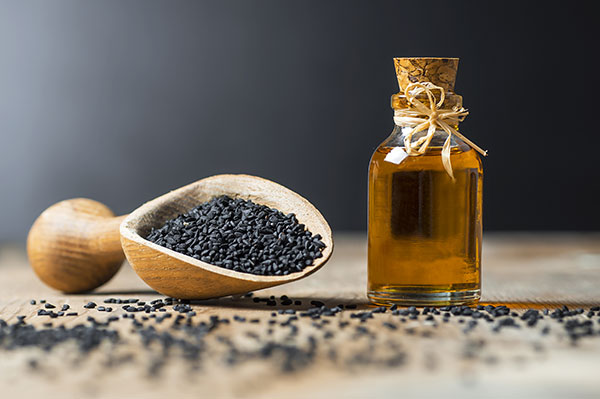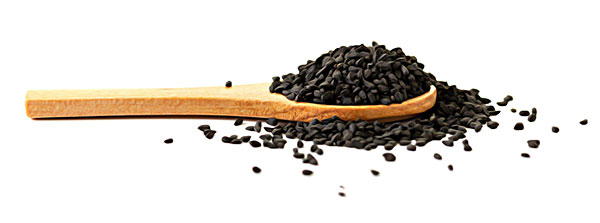Black cumin has been known as a medicinal plant for thousands of years, especially in the Orient. It is used as a spice and as an oil in many ways.
Its beneficial properties are mentioned in the Bible and the prophet Mohammed is quoted as saying: “Black cumin cures every disease except death.” In Egypt it was called the gold of the pharaohs and Nefertiti is said to have rubbed herself with it regularly.
The botanical name of black cumin is Nigella sativa, while the plant is popularly known under many names, like “kalonji” (from Hindi), “Roman coriander”, or here in Germany “Catherine’s flower”, due to its wheel-shaped flowers. In Europe, it was first cultivated during the Middle Ages as a medicinal plant by monks in their monastery gardens.
Black cumin and its effects
To obtain oil, the seeds are cold pressed gently, as many ingredients are sensitive to heat and would otherwise lose their effectiveness.
The extracted oil is mainly used to strengthen the immune system, for fungal infections, for respiratory diseases and for the treatment of skin diseases. The effect is based on a variety of ingredients that work together synergistically. These include saturated and unsaturated fatty acids, amino acids, coumarins and saponins. The latter help control flu-like infections and facilitate breathing in bronchitis. In addition, some of the essential oils in black cumin oil have a disinfecting and antifungal effect. The contained thymoquinone also decreases blood sugar levels.

Overall, the following effects are attributed to black cumin:
- analgesic
- lowering cholesterol
- lowering blood sugar
- antibacterial
- antifungal
- anti-inflammatory
- protecting the skin.
By now, there are more than a thousand studies worldwide that document the effect of black cumin on various conditions.
In European naturopathy, black cumin is used for the following clinical syndromes:
- allergies
- neurodermatitis
- psoriasis
- asthma
- diabetes
- digestive problems
- parasitic and fungal infections of the gastrointestinal tract
- high blood pressure.
Black cumin in Ayurveda
The taste of black cumin seeds is pungent and bitter and has a stimulating, warming effect. These properties decrease Vata and Kapha Dosha, while Pitta Dosha tends to increase. People with excess Pitta may therefore find it difficult to tolerate, and during pregnancy and lactation, black cumin should be avoided.
The seeds are mainly used in the form of powder (“Churna”), which is taken mixed with honey. The oil is used both internally and externally. In Ayurveda, black cumin is considered a digestive and appetizer, with properties of deflating, reducing Ama, supporting menstruation, and a tonic for the nervous system.
Cooking with black cumin
The seeds of the plant are very popular in oriental and also Indian cuisine and are the only part of the plant used in food. The taste can be described as slightly bitter and spicy. However, it has nothing in common with cumin, even if the name suggests it.
In traditional Indian cuisine, black cumin seed is mainly used in dishes with legumes, in vegetable dishes and in flat bread. Care should be taken not to roast the seeds for too long, otherwise the essential oils lose their effectiveness. Alternatively, they can be sprinkled over the dish towards the end.
The oil also has a strong flavor and is not suitable for frying or baking, but it can be used well for sauces and salads. Especially the combination with pumpkin seed oil makes for a harmonious blend.

Health benefits of black cumin
Black cumin in itself is usually well tolerated, but it should be tested in small quantities to start with and not be taken for longer than 3 months.
Always look for high quality and prefer organically grown products. The oil should be stored in the refrigerator and can be used for 12 months after opening.
Internal application
Especially with common prosperity diseases like overweight, diabetes, increased cholesterol and high blood pressure, internally applied black cumin oil can be a useful accompanying measure with other treatments.
Numerous studies show a significant effect, which can already occur from 5 ml of black cumin oil daily. Modulating influences have also been reported for autoimmune diseases such as rheumatoid arthritis and Hashimoto’s thyroiditis.
- For general strengthening of the immune system or as a support for the disorders listed above, take one teaspoon of black cumin oil once a day or stir it into a liquid. If well tolerated, the dose can be increased to 2 teaspoons daily.
- For respiratory problems, pour 2 liters of hot water into a pot or bowl and add 2 tablespoons of black cumin oil. Then inhale the vapors for 10 minutes.
- If you have a cold, drink a large glass of lukewarm water with a teaspoon of honey and half a teaspoon of black cumin oil twice a day.
- In case of toothache, chew on the seeds for 5 minutes.
External application
Due to the fatty acids and essential oils it contains, black cumin oil is very suitable for skin care in case of itchy and irritated skin and for body parts that are painful, e.g. with joint complaints. For this purpose, you can use the pure oil or resort to ready-made creams from the pharmacy.
- For skin problems such as neurodermatitis, acne or psoriasis, gently apply oil to the affected area in the morning and evening.
- For joint problems, massage the aching joints regularly with black cumin oil.
- For chest pain, massaging the tissue with the oil can provide relief.
- For allergic hay fever, gently drip 1–2 drops into the nose with a pipette.
- For hair care, work the oil into the hair tips.

© Maharishi Ayurveda Privatklinik Bad Ems
Very intersting! Thank you so much!
Jai Guru Dev!
Mikael and Birgitta Liljeqvist